The Right of Prisoners to Vote: A Debate on Democracy and Law
VerifiedAdded on 2019/10/31
|8
|2195
|27
Essay
AI Summary
This essay examines the debate on whether prisoners should have the right to vote, focusing on key constitutional principles such as democracy, parliamentary supremacy, social contract theory, and the rule of law. The author argues that denying prisoners the right to vote infringes upon their fundamental rights as citizens, citing the New Zealand Bill of Rights Act and relevant case law, including McGinty v Western Australia and Richard Sauvé v The Attorney General of Canada. The essay emphasizes that in a democratic society, all citizens, including those incarcerated, should have the right to participate in the electoral process. The author also explores the implications of parliamentary supremacy and the rule of law, arguing that any legislation that disenfranchises prisoners is discriminatory and undermines the principles of fairness and equality. The essay concludes by reiterating the importance of upholding prisoners' right to vote as a fundamental aspect of a just and democratic society, highlighting the need for legislative caution when dealing with human rights issues.
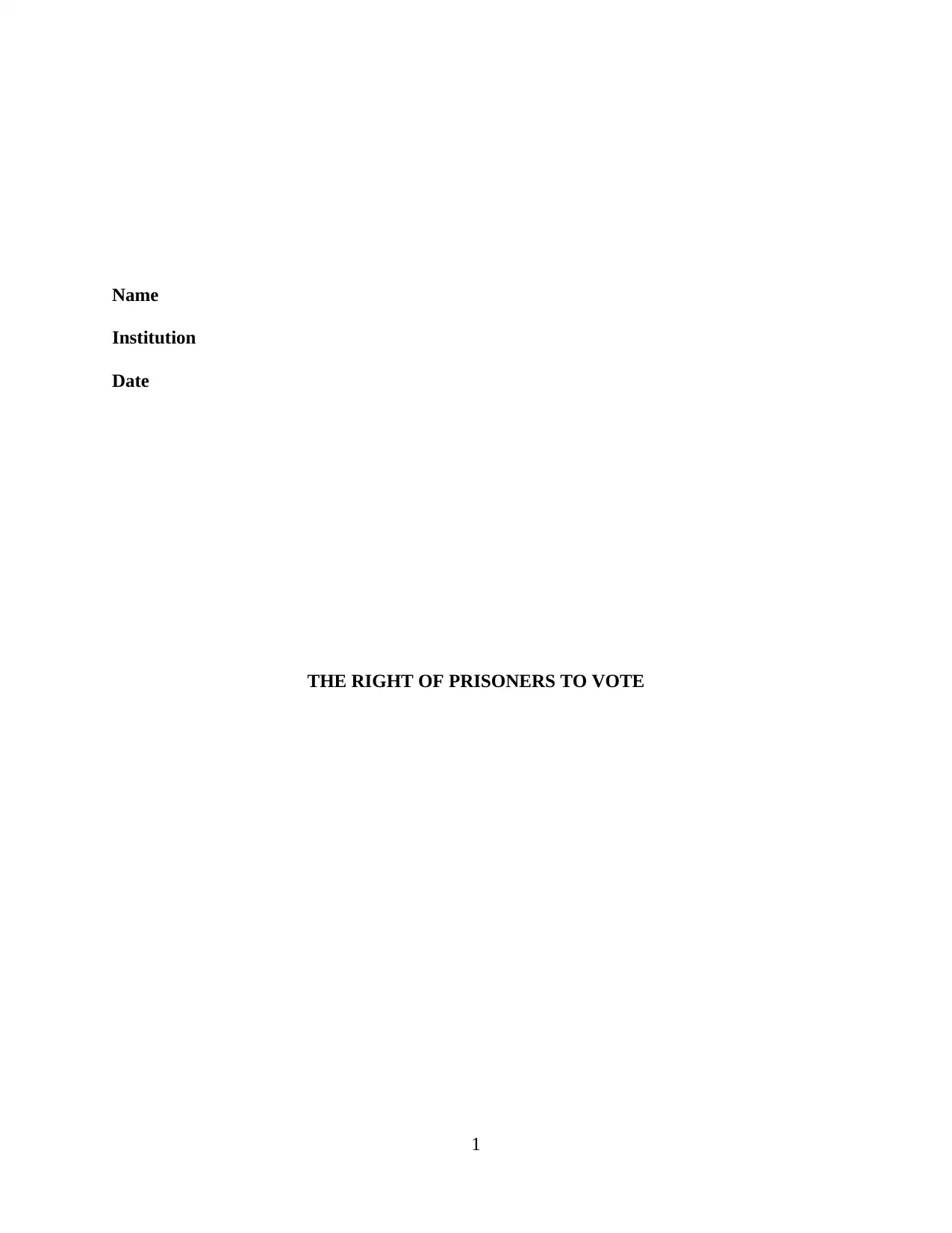
Name
Institution
Date
THE RIGHT OF PRISONERS TO VOTE
1
Institution
Date
THE RIGHT OF PRISONERS TO VOTE
1
Paraphrase This Document
Need a fresh take? Get an instant paraphrase of this document with our AI Paraphraser
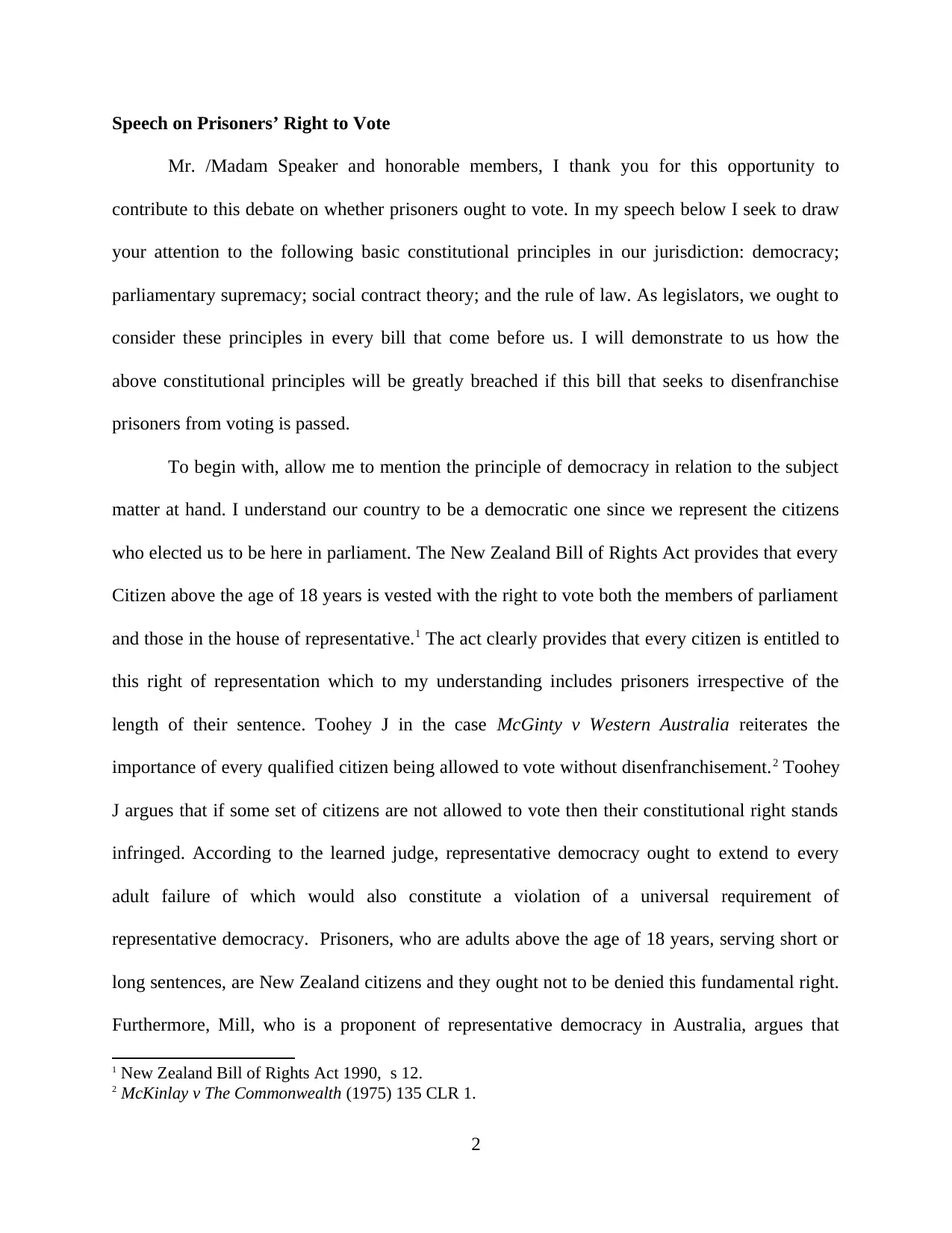
Speech on Prisoners’ Right to Vote
Mr. /Madam Speaker and honorable members, I thank you for this opportunity to
contribute to this debate on whether prisoners ought to vote. In my speech below I seek to draw
your attention to the following basic constitutional principles in our jurisdiction: democracy;
parliamentary supremacy; social contract theory; and the rule of law. As legislators, we ought to
consider these principles in every bill that come before us. I will demonstrate to us how the
above constitutional principles will be greatly breached if this bill that seeks to disenfranchise
prisoners from voting is passed.
To begin with, allow me to mention the principle of democracy in relation to the subject
matter at hand. I understand our country to be a democratic one since we represent the citizens
who elected us to be here in parliament. The New Zealand Bill of Rights Act provides that every
Citizen above the age of 18 years is vested with the right to vote both the members of parliament
and those in the house of representative.1 The act clearly provides that every citizen is entitled to
this right of representation which to my understanding includes prisoners irrespective of the
length of their sentence. Toohey J in the case McGinty v Western Australia reiterates the
importance of every qualified citizen being allowed to vote without disenfranchisement.2 Toohey
J argues that if some set of citizens are not allowed to vote then their constitutional right stands
infringed. According to the learned judge, representative democracy ought to extend to every
adult failure of which would also constitute a violation of a universal requirement of
representative democracy. Prisoners, who are adults above the age of 18 years, serving short or
long sentences, are New Zealand citizens and they ought not to be denied this fundamental right.
Furthermore, Mill, who is a proponent of representative democracy in Australia, argues that
1 New Zealand Bill of Rights Act 1990, s 12.
2 McKinlay v The Commonwealth (1975) 135 CLR 1.
2
Mr. /Madam Speaker and honorable members, I thank you for this opportunity to
contribute to this debate on whether prisoners ought to vote. In my speech below I seek to draw
your attention to the following basic constitutional principles in our jurisdiction: democracy;
parliamentary supremacy; social contract theory; and the rule of law. As legislators, we ought to
consider these principles in every bill that come before us. I will demonstrate to us how the
above constitutional principles will be greatly breached if this bill that seeks to disenfranchise
prisoners from voting is passed.
To begin with, allow me to mention the principle of democracy in relation to the subject
matter at hand. I understand our country to be a democratic one since we represent the citizens
who elected us to be here in parliament. The New Zealand Bill of Rights Act provides that every
Citizen above the age of 18 years is vested with the right to vote both the members of parliament
and those in the house of representative.1 The act clearly provides that every citizen is entitled to
this right of representation which to my understanding includes prisoners irrespective of the
length of their sentence. Toohey J in the case McGinty v Western Australia reiterates the
importance of every qualified citizen being allowed to vote without disenfranchisement.2 Toohey
J argues that if some set of citizens are not allowed to vote then their constitutional right stands
infringed. According to the learned judge, representative democracy ought to extend to every
adult failure of which would also constitute a violation of a universal requirement of
representative democracy. Prisoners, who are adults above the age of 18 years, serving short or
long sentences, are New Zealand citizens and they ought not to be denied this fundamental right.
Furthermore, Mill, who is a proponent of representative democracy in Australia, argues that
1 New Zealand Bill of Rights Act 1990, s 12.
2 McKinlay v The Commonwealth (1975) 135 CLR 1.
2
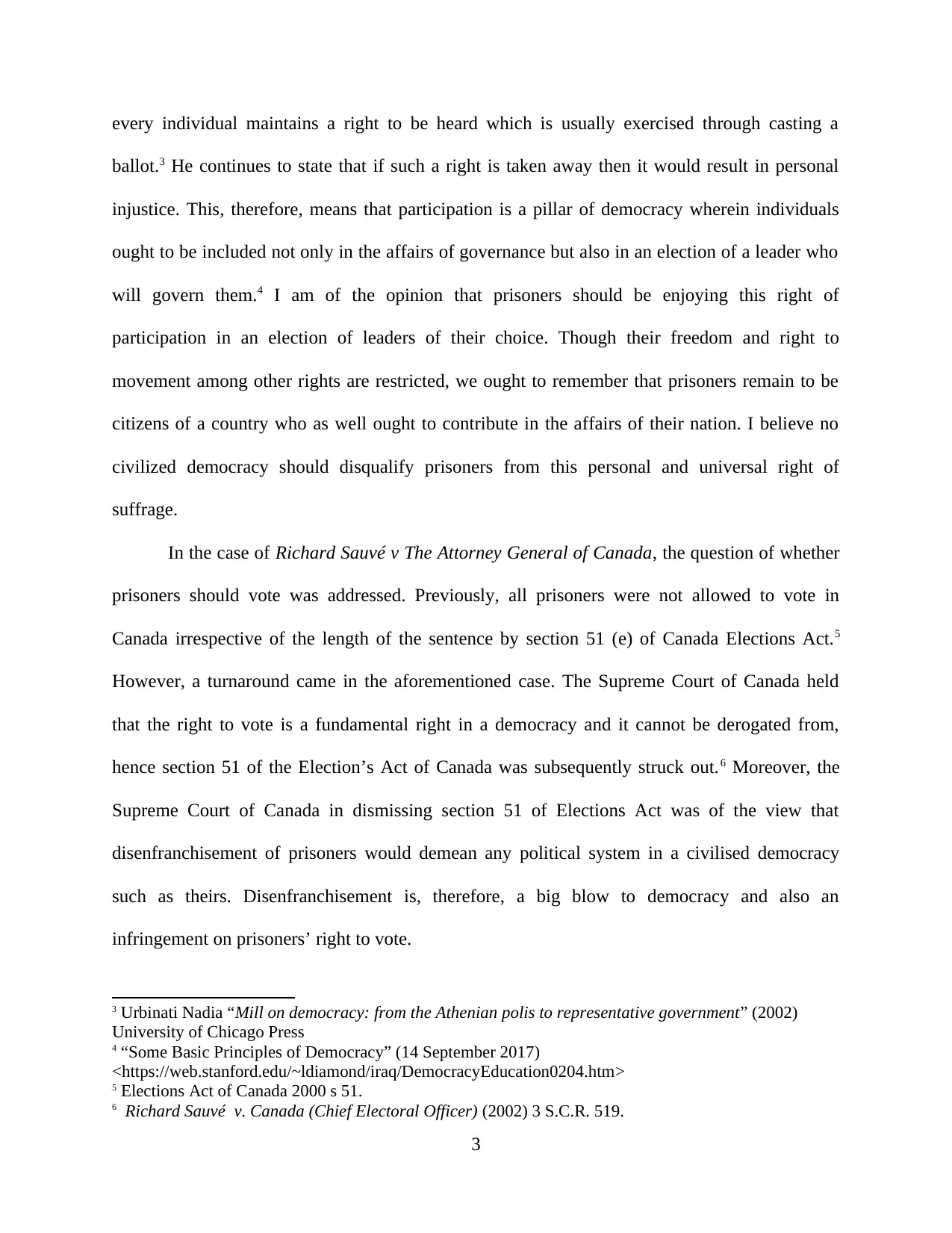
every individual maintains a right to be heard which is usually exercised through casting a
ballot.3 He continues to state that if such a right is taken away then it would result in personal
injustice. This, therefore, means that participation is a pillar of democracy wherein individuals
ought to be included not only in the affairs of governance but also in an election of a leader who
will govern them.4 I am of the opinion that prisoners should be enjoying this right of
participation in an election of leaders of their choice. Though their freedom and right to
movement among other rights are restricted, we ought to remember that prisoners remain to be
citizens of a country who as well ought to contribute in the affairs of their nation. I believe no
civilized democracy should disqualify prisoners from this personal and universal right of
suffrage.
In the case of Richard Sauvé v The Attorney General of Canada, the question of whether
prisoners should vote was addressed. Previously, all prisoners were not allowed to vote in
Canada irrespective of the length of the sentence by section 51 (e) of Canada Elections Act.5
However, a turnaround came in the aforementioned case. The Supreme Court of Canada held
that the right to vote is a fundamental right in a democracy and it cannot be derogated from,
hence section 51 of the Election’s Act of Canada was subsequently struck out.6 Moreover, the
Supreme Court of Canada in dismissing section 51 of Elections Act was of the view that
disenfranchisement of prisoners would demean any political system in a civilised democracy
such as theirs. Disenfranchisement is, therefore, a big blow to democracy and also an
infringement on prisoners’ right to vote.
3 Urbinati Nadia “Mill on democracy: from the Athenian polis to representative government” (2002)
University of Chicago Press
4 “Some Basic Principles of Democracy” (14 September 2017)
<https://web.stanford.edu/~ldiamond/iraq/DemocracyEducation0204.htm>
5 Elections Act of Canada 2000 s 51.
6 Richard Sauvé v. Canada (Chief Electoral Officer) (2002) 3 S.C.R. 519.
3
ballot.3 He continues to state that if such a right is taken away then it would result in personal
injustice. This, therefore, means that participation is a pillar of democracy wherein individuals
ought to be included not only in the affairs of governance but also in an election of a leader who
will govern them.4 I am of the opinion that prisoners should be enjoying this right of
participation in an election of leaders of their choice. Though their freedom and right to
movement among other rights are restricted, we ought to remember that prisoners remain to be
citizens of a country who as well ought to contribute in the affairs of their nation. I believe no
civilized democracy should disqualify prisoners from this personal and universal right of
suffrage.
In the case of Richard Sauvé v The Attorney General of Canada, the question of whether
prisoners should vote was addressed. Previously, all prisoners were not allowed to vote in
Canada irrespective of the length of the sentence by section 51 (e) of Canada Elections Act.5
However, a turnaround came in the aforementioned case. The Supreme Court of Canada held
that the right to vote is a fundamental right in a democracy and it cannot be derogated from,
hence section 51 of the Election’s Act of Canada was subsequently struck out.6 Moreover, the
Supreme Court of Canada in dismissing section 51 of Elections Act was of the view that
disenfranchisement of prisoners would demean any political system in a civilised democracy
such as theirs. Disenfranchisement is, therefore, a big blow to democracy and also an
infringement on prisoners’ right to vote.
3 Urbinati Nadia “Mill on democracy: from the Athenian polis to representative government” (2002)
University of Chicago Press
4 “Some Basic Principles of Democracy” (14 September 2017)
<https://web.stanford.edu/~ldiamond/iraq/DemocracyEducation0204.htm>
5 Elections Act of Canada 2000 s 51.
6 Richard Sauvé v. Canada (Chief Electoral Officer) (2002) 3 S.C.R. 519.
3
⊘ This is a preview!⊘
Do you want full access?
Subscribe today to unlock all pages.

Trusted by 1+ million students worldwide
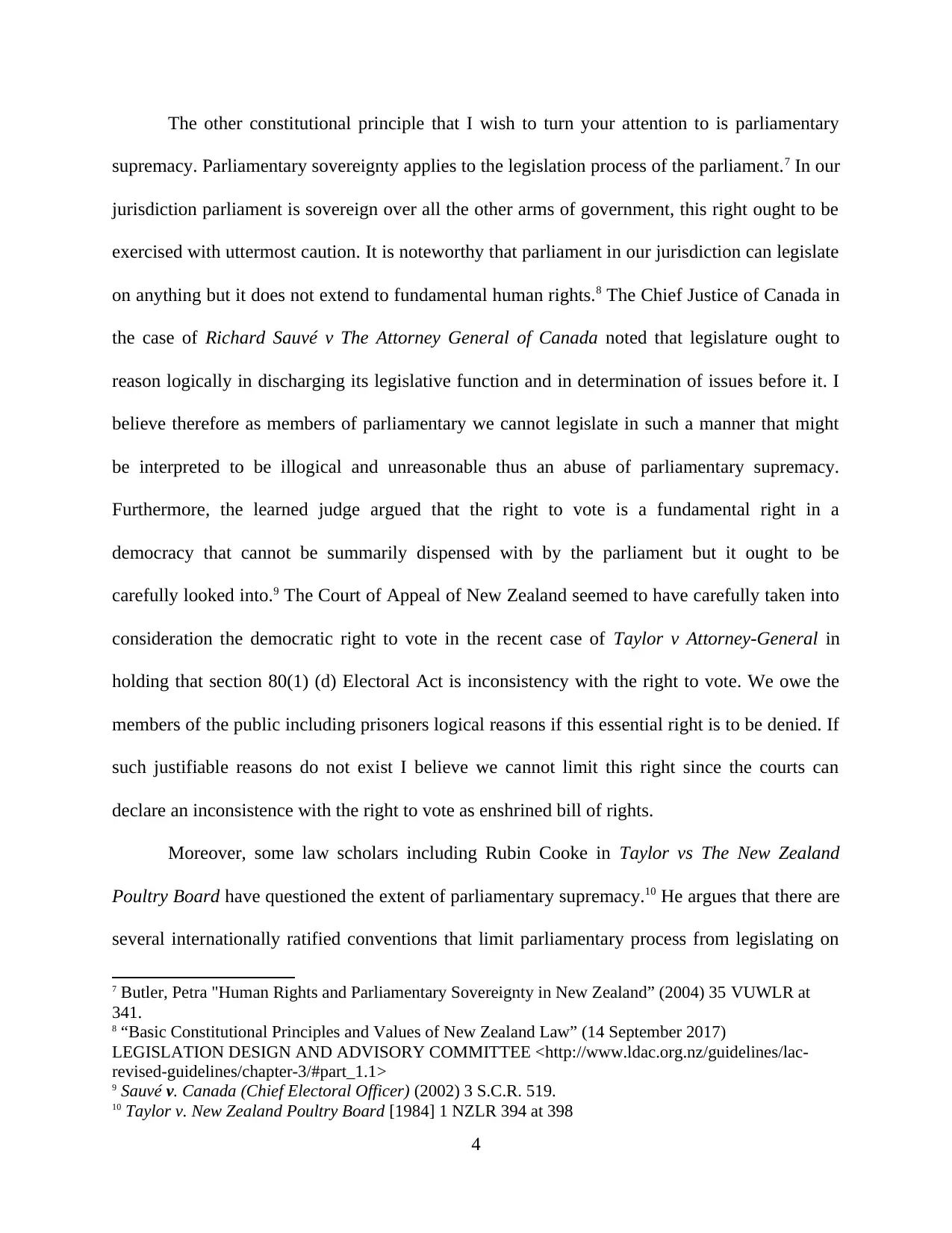
The other constitutional principle that I wish to turn your attention to is parliamentary
supremacy. Parliamentary sovereignty applies to the legislation process of the parliament.7 In our
jurisdiction parliament is sovereign over all the other arms of government, this right ought to be
exercised with uttermost caution. It is noteworthy that parliament in our jurisdiction can legislate
on anything but it does not extend to fundamental human rights.8 The Chief Justice of Canada in
the case of Richard Sauvé v The Attorney General of Canada noted that legislature ought to
reason logically in discharging its legislative function and in determination of issues before it. I
believe therefore as members of parliamentary we cannot legislate in such a manner that might
be interpreted to be illogical and unreasonable thus an abuse of parliamentary supremacy.
Furthermore, the learned judge argued that the right to vote is a fundamental right in a
democracy that cannot be summarily dispensed with by the parliament but it ought to be
carefully looked into.9 The Court of Appeal of New Zealand seemed to have carefully taken into
consideration the democratic right to vote in the recent case of Taylor v Attorney-General in
holding that section 80(1) (d) Electoral Act is inconsistency with the right to vote. We owe the
members of the public including prisoners logical reasons if this essential right is to be denied. If
such justifiable reasons do not exist I believe we cannot limit this right since the courts can
declare an inconsistence with the right to vote as enshrined bill of rights.
Moreover, some law scholars including Rubin Cooke in Taylor vs The New Zealand
Poultry Board have questioned the extent of parliamentary supremacy.10 He argues that there are
several internationally ratified conventions that limit parliamentary process from legislating on
7 Butler, Petra "Human Rights and Parliamentary Sovereignty in New Zealand” (2004) 35 VUWLR at
341.
8 “Basic Constitutional Principles and Values of New Zealand Law” (14 September 2017)
LEGISLATION DESIGN AND ADVISORY COMMITTEE <http://www.ldac.org.nz/guidelines/lac-
revised-guidelines/chapter-3/#part_1.1>
9 Sauvé v. Canada (Chief Electoral Officer) (2002) 3 S.C.R. 519.
10 Taylor v. New Zealand Poultry Board [1984] 1 NZLR 394 at 398
4
supremacy. Parliamentary sovereignty applies to the legislation process of the parliament.7 In our
jurisdiction parliament is sovereign over all the other arms of government, this right ought to be
exercised with uttermost caution. It is noteworthy that parliament in our jurisdiction can legislate
on anything but it does not extend to fundamental human rights.8 The Chief Justice of Canada in
the case of Richard Sauvé v The Attorney General of Canada noted that legislature ought to
reason logically in discharging its legislative function and in determination of issues before it. I
believe therefore as members of parliamentary we cannot legislate in such a manner that might
be interpreted to be illogical and unreasonable thus an abuse of parliamentary supremacy.
Furthermore, the learned judge argued that the right to vote is a fundamental right in a
democracy that cannot be summarily dispensed with by the parliament but it ought to be
carefully looked into.9 The Court of Appeal of New Zealand seemed to have carefully taken into
consideration the democratic right to vote in the recent case of Taylor v Attorney-General in
holding that section 80(1) (d) Electoral Act is inconsistency with the right to vote. We owe the
members of the public including prisoners logical reasons if this essential right is to be denied. If
such justifiable reasons do not exist I believe we cannot limit this right since the courts can
declare an inconsistence with the right to vote as enshrined bill of rights.
Moreover, some law scholars including Rubin Cooke in Taylor vs The New Zealand
Poultry Board have questioned the extent of parliamentary supremacy.10 He argues that there are
several internationally ratified conventions that limit parliamentary process from legislating on
7 Butler, Petra "Human Rights and Parliamentary Sovereignty in New Zealand” (2004) 35 VUWLR at
341.
8 “Basic Constitutional Principles and Values of New Zealand Law” (14 September 2017)
LEGISLATION DESIGN AND ADVISORY COMMITTEE <http://www.ldac.org.nz/guidelines/lac-
revised-guidelines/chapter-3/#part_1.1>
9 Sauvé v. Canada (Chief Electoral Officer) (2002) 3 S.C.R. 519.
10 Taylor v. New Zealand Poultry Board [1984] 1 NZLR 394 at 398
4
Paraphrase This Document
Need a fresh take? Get an instant paraphrase of this document with our AI Paraphraser
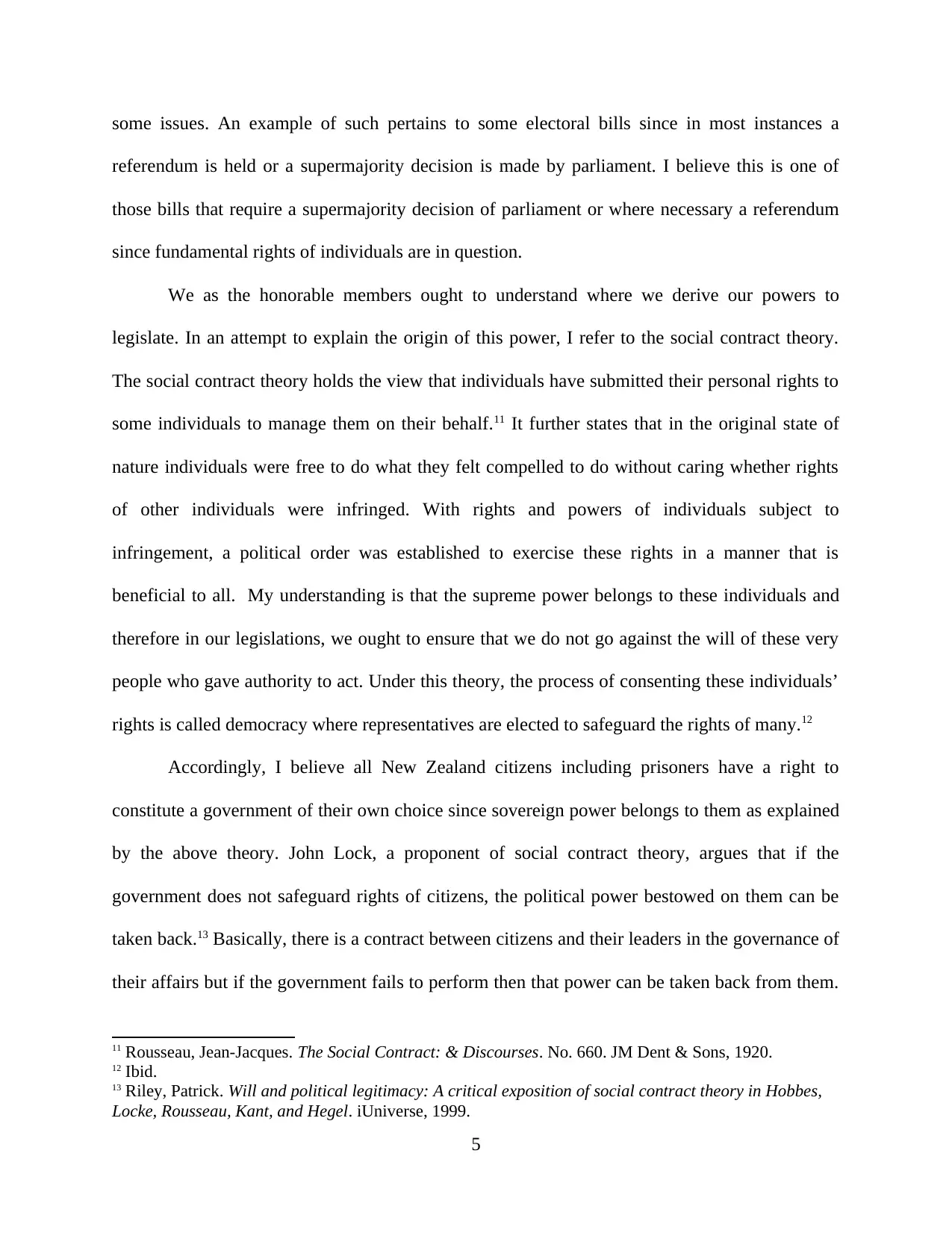
some issues. An example of such pertains to some electoral bills since in most instances a
referendum is held or a supermajority decision is made by parliament. I believe this is one of
those bills that require a supermajority decision of parliament or where necessary a referendum
since fundamental rights of individuals are in question.
We as the honorable members ought to understand where we derive our powers to
legislate. In an attempt to explain the origin of this power, I refer to the social contract theory.
The social contract theory holds the view that individuals have submitted their personal rights to
some individuals to manage them on their behalf.11 It further states that in the original state of
nature individuals were free to do what they felt compelled to do without caring whether rights
of other individuals were infringed. With rights and powers of individuals subject to
infringement, a political order was established to exercise these rights in a manner that is
beneficial to all. My understanding is that the supreme power belongs to these individuals and
therefore in our legislations, we ought to ensure that we do not go against the will of these very
people who gave authority to act. Under this theory, the process of consenting these individuals’
rights is called democracy where representatives are elected to safeguard the rights of many.12
Accordingly, I believe all New Zealand citizens including prisoners have a right to
constitute a government of their own choice since sovereign power belongs to them as explained
by the above theory. John Lock, a proponent of social contract theory, argues that if the
government does not safeguard rights of citizens, the political power bestowed on them can be
taken back.13 Basically, there is a contract between citizens and their leaders in the governance of
their affairs but if the government fails to perform then that power can be taken back from them.
11 Rousseau, Jean-Jacques. The Social Contract: & Discourses. No. 660. JM Dent & Sons, 1920.
12 Ibid.
13 Riley, Patrick. Will and political legitimacy: A critical exposition of social contract theory in Hobbes,
Locke, Rousseau, Kant, and Hegel. iUniverse, 1999.
5
referendum is held or a supermajority decision is made by parliament. I believe this is one of
those bills that require a supermajority decision of parliament or where necessary a referendum
since fundamental rights of individuals are in question.
We as the honorable members ought to understand where we derive our powers to
legislate. In an attempt to explain the origin of this power, I refer to the social contract theory.
The social contract theory holds the view that individuals have submitted their personal rights to
some individuals to manage them on their behalf.11 It further states that in the original state of
nature individuals were free to do what they felt compelled to do without caring whether rights
of other individuals were infringed. With rights and powers of individuals subject to
infringement, a political order was established to exercise these rights in a manner that is
beneficial to all. My understanding is that the supreme power belongs to these individuals and
therefore in our legislations, we ought to ensure that we do not go against the will of these very
people who gave authority to act. Under this theory, the process of consenting these individuals’
rights is called democracy where representatives are elected to safeguard the rights of many.12
Accordingly, I believe all New Zealand citizens including prisoners have a right to
constitute a government of their own choice since sovereign power belongs to them as explained
by the above theory. John Lock, a proponent of social contract theory, argues that if the
government does not safeguard rights of citizens, the political power bestowed on them can be
taken back.13 Basically, there is a contract between citizens and their leaders in the governance of
their affairs but if the government fails to perform then that power can be taken back from them.
11 Rousseau, Jean-Jacques. The Social Contract: & Discourses. No. 660. JM Dent & Sons, 1920.
12 Ibid.
13 Riley, Patrick. Will and political legitimacy: A critical exposition of social contract theory in Hobbes,
Locke, Rousseau, Kant, and Hegel. iUniverse, 1999.
5
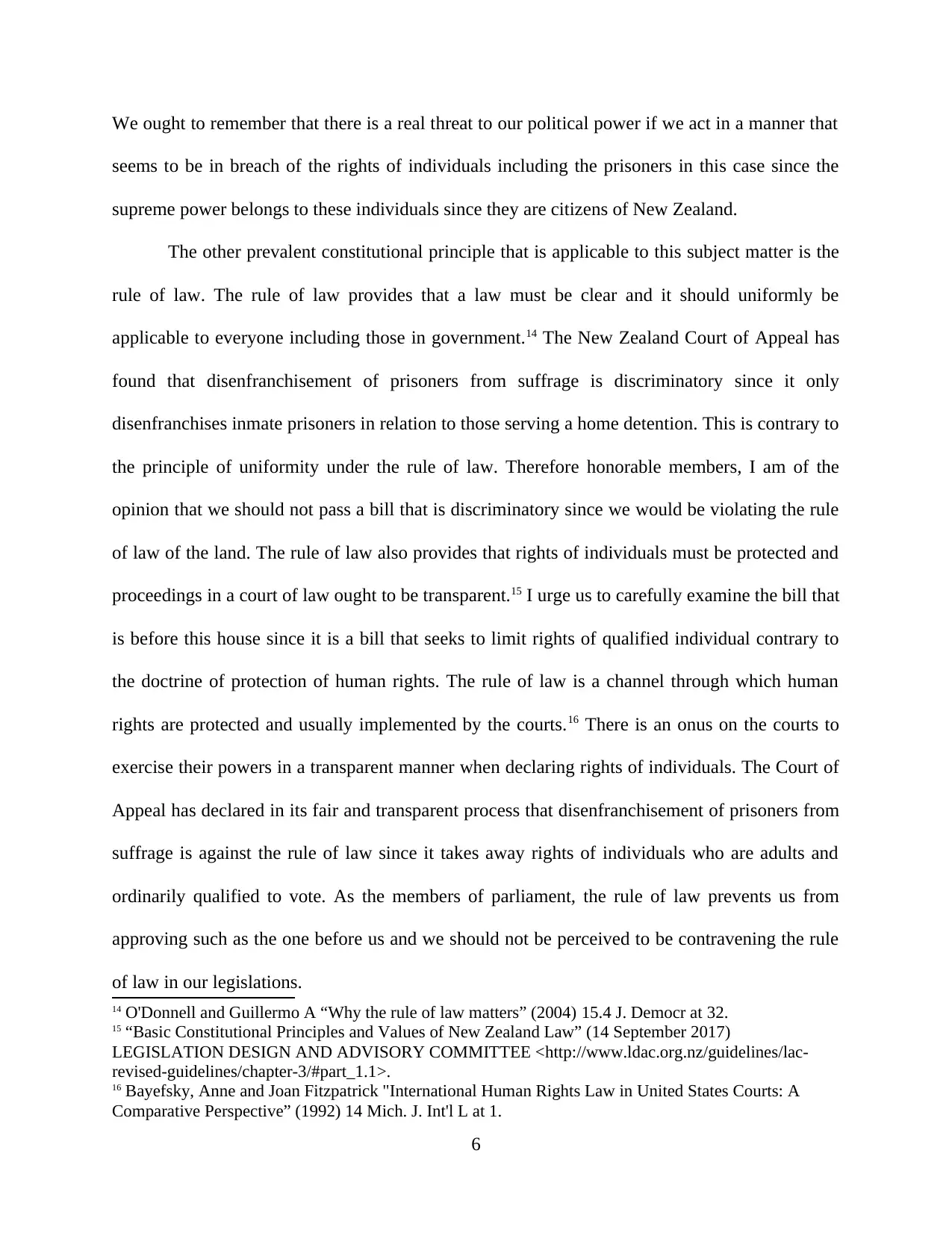
We ought to remember that there is a real threat to our political power if we act in a manner that
seems to be in breach of the rights of individuals including the prisoners in this case since the
supreme power belongs to these individuals since they are citizens of New Zealand.
The other prevalent constitutional principle that is applicable to this subject matter is the
rule of law. The rule of law provides that a law must be clear and it should uniformly be
applicable to everyone including those in government.14 The New Zealand Court of Appeal has
found that disenfranchisement of prisoners from suffrage is discriminatory since it only
disenfranchises inmate prisoners in relation to those serving a home detention. This is contrary to
the principle of uniformity under the rule of law. Therefore honorable members, I am of the
opinion that we should not pass a bill that is discriminatory since we would be violating the rule
of law of the land. The rule of law also provides that rights of individuals must be protected and
proceedings in a court of law ought to be transparent.15 I urge us to carefully examine the bill that
is before this house since it is a bill that seeks to limit rights of qualified individual contrary to
the doctrine of protection of human rights. The rule of law is a channel through which human
rights are protected and usually implemented by the courts.16 There is an onus on the courts to
exercise their powers in a transparent manner when declaring rights of individuals. The Court of
Appeal has declared in its fair and transparent process that disenfranchisement of prisoners from
suffrage is against the rule of law since it takes away rights of individuals who are adults and
ordinarily qualified to vote. As the members of parliament, the rule of law prevents us from
approving such as the one before us and we should not be perceived to be contravening the rule
of law in our legislations.
14 O'Donnell and Guillermo A “Why the rule of law matters” (2004) 15.4 J. Democr at 32.
15 “Basic Constitutional Principles and Values of New Zealand Law” (14 September 2017)
LEGISLATION DESIGN AND ADVISORY COMMITTEE <http://www.ldac.org.nz/guidelines/lac-
revised-guidelines/chapter-3/#part_1.1>.
16 Bayefsky, Anne and Joan Fitzpatrick "International Human Rights Law in United States Courts: A
Comparative Perspective” (1992) 14 Mich. J. Int'l L at 1.
6
seems to be in breach of the rights of individuals including the prisoners in this case since the
supreme power belongs to these individuals since they are citizens of New Zealand.
The other prevalent constitutional principle that is applicable to this subject matter is the
rule of law. The rule of law provides that a law must be clear and it should uniformly be
applicable to everyone including those in government.14 The New Zealand Court of Appeal has
found that disenfranchisement of prisoners from suffrage is discriminatory since it only
disenfranchises inmate prisoners in relation to those serving a home detention. This is contrary to
the principle of uniformity under the rule of law. Therefore honorable members, I am of the
opinion that we should not pass a bill that is discriminatory since we would be violating the rule
of law of the land. The rule of law also provides that rights of individuals must be protected and
proceedings in a court of law ought to be transparent.15 I urge us to carefully examine the bill that
is before this house since it is a bill that seeks to limit rights of qualified individual contrary to
the doctrine of protection of human rights. The rule of law is a channel through which human
rights are protected and usually implemented by the courts.16 There is an onus on the courts to
exercise their powers in a transparent manner when declaring rights of individuals. The Court of
Appeal has declared in its fair and transparent process that disenfranchisement of prisoners from
suffrage is against the rule of law since it takes away rights of individuals who are adults and
ordinarily qualified to vote. As the members of parliament, the rule of law prevents us from
approving such as the one before us and we should not be perceived to be contravening the rule
of law in our legislations.
14 O'Donnell and Guillermo A “Why the rule of law matters” (2004) 15.4 J. Democr at 32.
15 “Basic Constitutional Principles and Values of New Zealand Law” (14 September 2017)
LEGISLATION DESIGN AND ADVISORY COMMITTEE <http://www.ldac.org.nz/guidelines/lac-
revised-guidelines/chapter-3/#part_1.1>.
16 Bayefsky, Anne and Joan Fitzpatrick "International Human Rights Law in United States Courts: A
Comparative Perspective” (1992) 14 Mich. J. Int'l L at 1.
6
⊘ This is a preview!⊘
Do you want full access?
Subscribe today to unlock all pages.

Trusted by 1+ million students worldwide
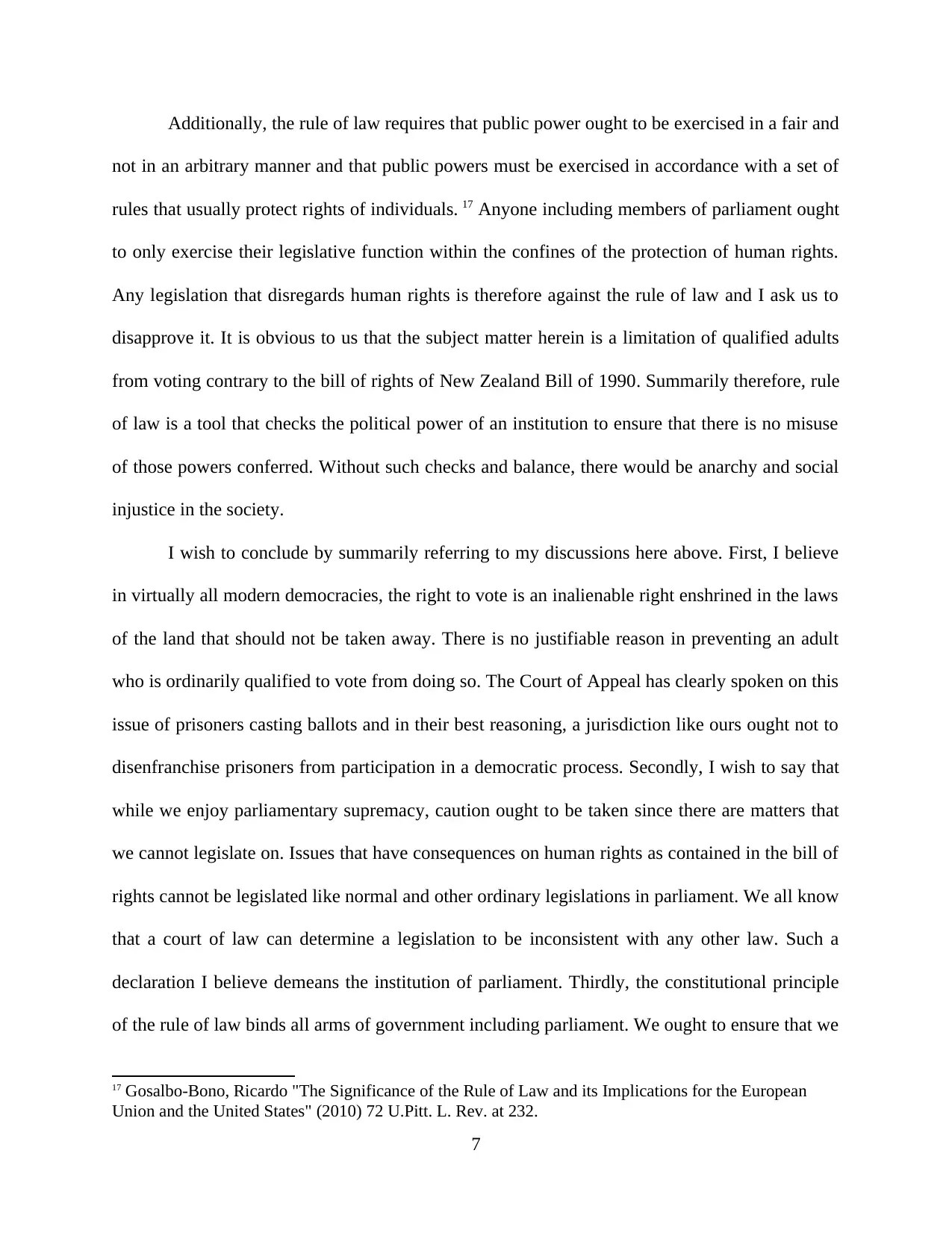
Additionally, the rule of law requires that public power ought to be exercised in a fair and
not in an arbitrary manner and that public powers must be exercised in accordance with a set of
rules that usually protect rights of individuals. 17 Anyone including members of parliament ought
to only exercise their legislative function within the confines of the protection of human rights.
Any legislation that disregards human rights is therefore against the rule of law and I ask us to
disapprove it. It is obvious to us that the subject matter herein is a limitation of qualified adults
from voting contrary to the bill of rights of New Zealand Bill of 1990. Summarily therefore, rule
of law is a tool that checks the political power of an institution to ensure that there is no misuse
of those powers conferred. Without such checks and balance, there would be anarchy and social
injustice in the society.
I wish to conclude by summarily referring to my discussions here above. First, I believe
in virtually all modern democracies, the right to vote is an inalienable right enshrined in the laws
of the land that should not be taken away. There is no justifiable reason in preventing an adult
who is ordinarily qualified to vote from doing so. The Court of Appeal has clearly spoken on this
issue of prisoners casting ballots and in their best reasoning, a jurisdiction like ours ought not to
disenfranchise prisoners from participation in a democratic process. Secondly, I wish to say that
while we enjoy parliamentary supremacy, caution ought to be taken since there are matters that
we cannot legislate on. Issues that have consequences on human rights as contained in the bill of
rights cannot be legislated like normal and other ordinary legislations in parliament. We all know
that a court of law can determine a legislation to be inconsistent with any other law. Such a
declaration I believe demeans the institution of parliament. Thirdly, the constitutional principle
of the rule of law binds all arms of government including parliament. We ought to ensure that we
17 Gosalbo-Bono, Ricardo "The Significance of the Rule of Law and its Implications for the European
Union and the United States" (2010) 72 U.Pitt. L. Rev. at 232.
7
not in an arbitrary manner and that public powers must be exercised in accordance with a set of
rules that usually protect rights of individuals. 17 Anyone including members of parliament ought
to only exercise their legislative function within the confines of the protection of human rights.
Any legislation that disregards human rights is therefore against the rule of law and I ask us to
disapprove it. It is obvious to us that the subject matter herein is a limitation of qualified adults
from voting contrary to the bill of rights of New Zealand Bill of 1990. Summarily therefore, rule
of law is a tool that checks the political power of an institution to ensure that there is no misuse
of those powers conferred. Without such checks and balance, there would be anarchy and social
injustice in the society.
I wish to conclude by summarily referring to my discussions here above. First, I believe
in virtually all modern democracies, the right to vote is an inalienable right enshrined in the laws
of the land that should not be taken away. There is no justifiable reason in preventing an adult
who is ordinarily qualified to vote from doing so. The Court of Appeal has clearly spoken on this
issue of prisoners casting ballots and in their best reasoning, a jurisdiction like ours ought not to
disenfranchise prisoners from participation in a democratic process. Secondly, I wish to say that
while we enjoy parliamentary supremacy, caution ought to be taken since there are matters that
we cannot legislate on. Issues that have consequences on human rights as contained in the bill of
rights cannot be legislated like normal and other ordinary legislations in parliament. We all know
that a court of law can determine a legislation to be inconsistent with any other law. Such a
declaration I believe demeans the institution of parliament. Thirdly, the constitutional principle
of the rule of law binds all arms of government including parliament. We ought to ensure that we
17 Gosalbo-Bono, Ricardo "The Significance of the Rule of Law and its Implications for the European
Union and the United States" (2010) 72 U.Pitt. L. Rev. at 232.
7
Paraphrase This Document
Need a fresh take? Get an instant paraphrase of this document with our AI Paraphraser
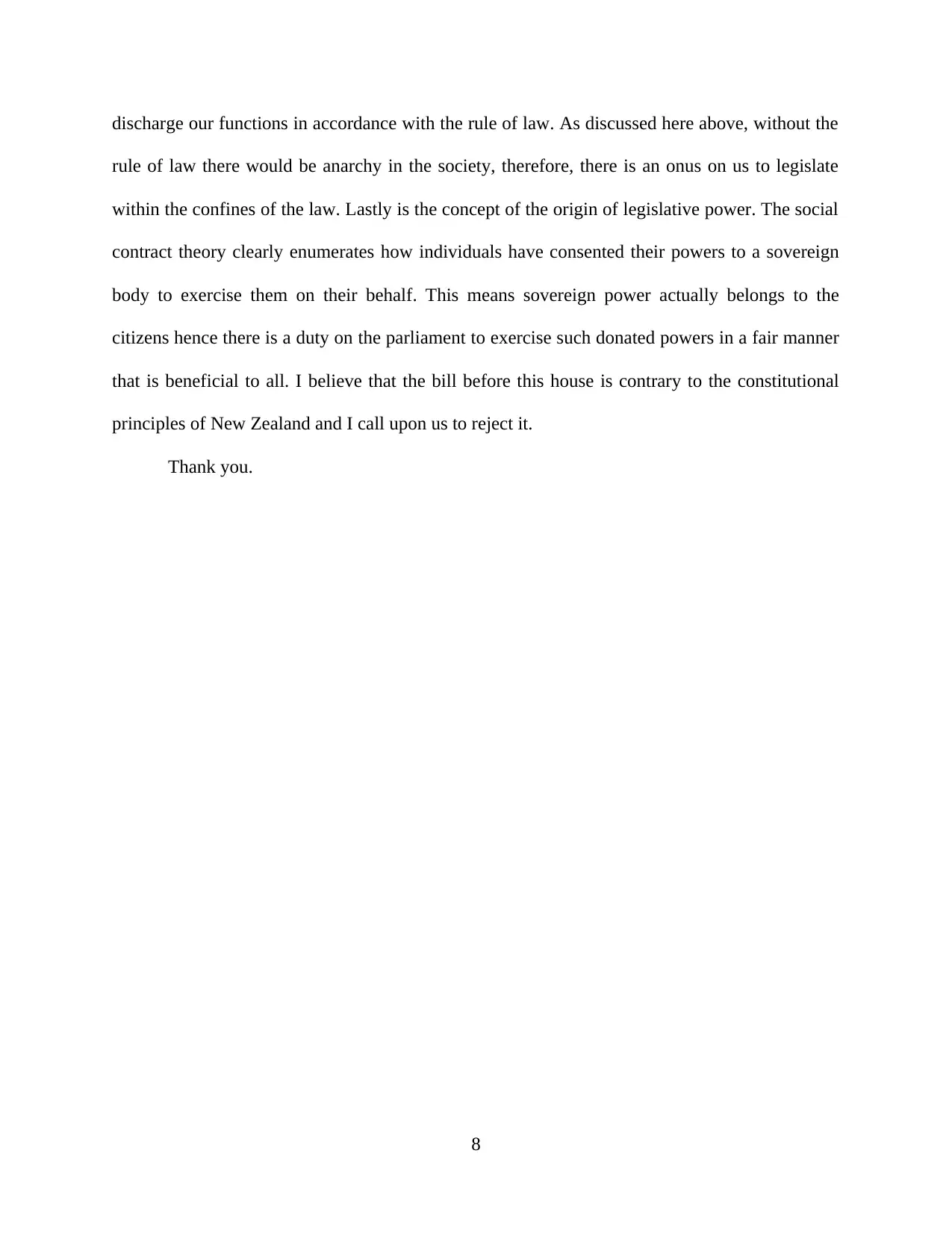
discharge our functions in accordance with the rule of law. As discussed here above, without the
rule of law there would be anarchy in the society, therefore, there is an onus on us to legislate
within the confines of the law. Lastly is the concept of the origin of legislative power. The social
contract theory clearly enumerates how individuals have consented their powers to a sovereign
body to exercise them on their behalf. This means sovereign power actually belongs to the
citizens hence there is a duty on the parliament to exercise such donated powers in a fair manner
that is beneficial to all. I believe that the bill before this house is contrary to the constitutional
principles of New Zealand and I call upon us to reject it.
Thank you.
8
rule of law there would be anarchy in the society, therefore, there is an onus on us to legislate
within the confines of the law. Lastly is the concept of the origin of legislative power. The social
contract theory clearly enumerates how individuals have consented their powers to a sovereign
body to exercise them on their behalf. This means sovereign power actually belongs to the
citizens hence there is a duty on the parliament to exercise such donated powers in a fair manner
that is beneficial to all. I believe that the bill before this house is contrary to the constitutional
principles of New Zealand and I call upon us to reject it.
Thank you.
8
1 out of 8
Your All-in-One AI-Powered Toolkit for Academic Success.
+13062052269
info@desklib.com
Available 24*7 on WhatsApp / Email
![[object Object]](/_next/static/media/star-bottom.7253800d.svg)
Unlock your academic potential
Copyright © 2020–2026 A2Z Services. All Rights Reserved. Developed and managed by ZUCOL.

